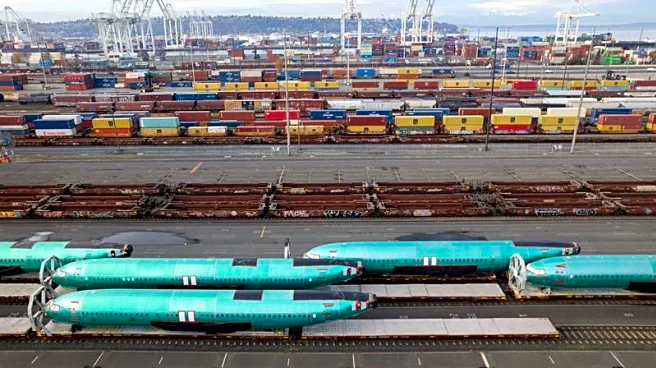What's Happening?
Kroger, a national grocery chain, has issued a recall for several shrimp products due to potential contamination with Cesium-137, a radioactive material. The recall affects both frozen and cooked shrimp products branded under Kroger and Aquastar. The recall was announced by Aquastar Corp on September 20, with the FDA publishing the notice on September 21. The products involved include Kroger Frozen Raw EZ Peel Shrimp, Kroger Mercado Frozen Cooked Shrimp, and Aquastar Raw Shrimp Skewers. The recall is due to concerns that the shrimp may have been prepared, packed, or held under insanitary conditions, leading to possible contamination. The affected products were sold in various states across the U.S. between June 12, 2025, and September 17, 2025.
Why It's Important?
The recall is significant as Cesium-137 is a radioactive material that poses serious health risks if ingested. This contamination could have occurred due to environmental factors where the shrimp were harvested, highlighting the importance of stringent food safety checks. The recall impacts consumers across multiple states, emphasizing the need for vigilance in food safety standards. The FDA's involvement underscores the potential severity of the contamination and the agency's role in ensuring public health safety. Consumers are advised to dispose of or return the affected products for a refund, and no illnesses have been reported so far.
What's Next?
The FDA is actively investigating the contamination reports and working with distributors and retailers to conduct a recall of products from PT. Bahari Makmur Sejati, the Indonesian processor involved. The agency is recommending firms conduct recalls for shipments that may have been contaminated. Consumers are urged to check their purchases against the provided lot codes and UPCs to ensure safety. The situation may lead to increased scrutiny and regulatory measures for imported seafood products to prevent future occurrences.
Beyond the Headlines
This recall highlights broader issues in global food supply chains, particularly the challenges of ensuring safety in imported goods. It raises questions about the environmental impact of nuclear activity and its potential to affect food sources. The incident may prompt discussions on improving international food safety standards and monitoring systems to prevent contamination.











